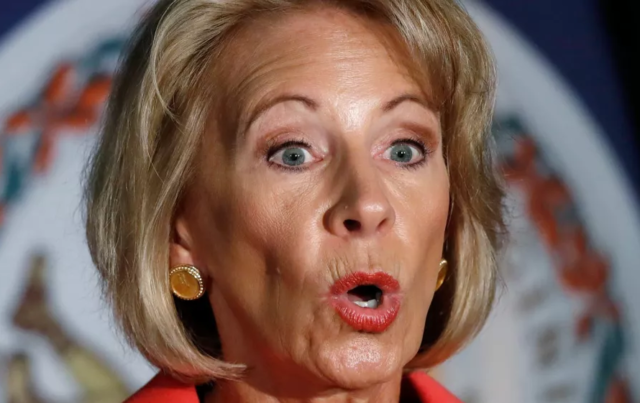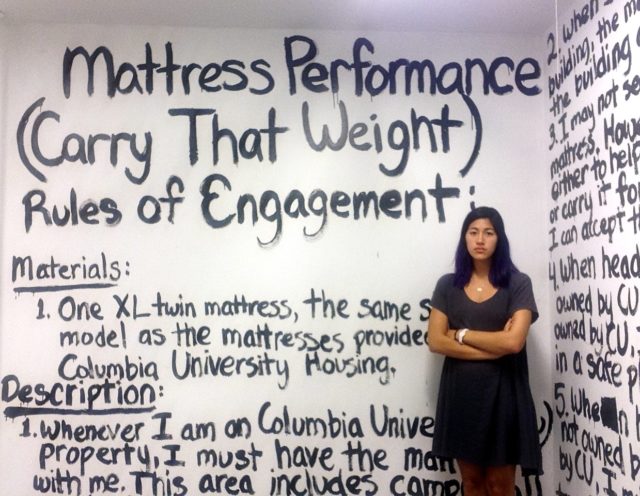Betsy DeVos’ Rescinding Of Title IX Condones Rape Culture On College Campuses

Betsy DeVos is on the wrong side of history.

When news broke that current Education SecretaryBetsy DeVos is rescinding Title IX protections for sexual assault survivors on Friday, my heart broke. I felt the pain of every survivor who has fought tirelessly to feel heard and validated on an American college campus. I felt the burden of every survivor who has gone through the intense (and re-traumatizing) reporting process, as well as to keep on top of their GPA. I felt the trauma of every survivor who didn’t report out of fear of victim blaming or retaliation from the person who caused them harm. I felt the hurt of every survivor who dropped out of school because the PTSD of having to see the person who caused them harm constantly on campus was far too much to bare.
The weight of this news made my whole being feel heavy. Those of us who work in anti-sexual violence advocacy saw this coming, but it still stung at our core. Because this denigrates all the hard work we do. A few weeks ago, Betsy DeVos made it a point to meet with several men who have been accused of rape and claim they didn’t do it. They claim it has “ruined their lives.”
I’m going to be harsh here: I don’t really care about how much being accused of rape has changed your life. Because guess what? Being raped and sexually violated turns your whole universe upside down—and then some. The likelihood that what these men claim is actually the truth is very low. Statistically, only 2% out of 100 rape cases end up being falsely accused.
In his “Dear Colleague…” letter addressed to the more than 7,000 colleges that use federal funding, President Obama wrote: “The sexual harassment of students, including sexual violence, interferes with students’ right to receive an education free from discrimination and, in the case of sexual violence, is a crime.”
This Obama-era policy is now gone all because Betsy DeVos felt that it was causing more pain to the people accused of rape. This language and reasoning upholds rape culture and even further, rape apologist ideology. Through this message, DeVos is telling the country that rape really isn’t that serious of a crime, that people should protect themselves from rape by not dressing certain ways or drinking too much, and that policies like Title IX are simply too politically correct.
This announcement comes during a period known as the “red zone”—the time when students are most likely to experience sexual assault when everyone is just starting to go back to campus. The first seven weeks back on campus is when undergraduate students are most likely to be sexually assaulted, studies show that as many as up to 50% of sexual assaults take place during this period. Now is when campuses should be having conversations about consent and providing comprehensive sex education to their students—not revoking protections.
As someone who works tirelessly to support survivors of sexual violence, I can tell you that in my professional opinion, Title IX was just a start. It wasn’t comprehensive enough. It wasn’t enough for what survivors are currently forced to deal with after experiencing sexual violence. It was a great step in the right direction. Joe Biden made many of those great strides on behalf of survivors during his time as Vice President. But what we needed next was another giant leap forward, not ten steps back.
#TitleIX is still the law. Survivors, you still have rights and protections, and your school has responsibilities to you. @knowyourIX pic.twitter.com/PjG2A3SyQm
— Audrie & Daisy Film (@AudrieandDaisy) September 22, 2017
What can Title IX do for sexual assault survivors?
The way the Title IX was read under the Obama administration, understood it as protections against sexual discrimination. Under Title IX, schools must ensure that all students have equal access to education, regardless of gender, sexual orientation, or gender identity. Sexual harassment and sexual violence are forms of gender discrimination that were prohibited by Title IX, including when the incident(s) occur off-campus or involve people who are not students.
This is the section that DeVos has in question.

When a student has experienced a hostile environment such sexual assault or severe, pervasive, and objectively offensive sexual harassment, schools must stop the discrimination, prevent its recurrence, and address its effects. This includes retaliation from other students, school administrators, or faculty.
Many schools have taken the time to set up a Title IX office to process these reports—though many survivors experience delays and a trial that more often than not sides with the person who caused harm. End Rape On Campus has listed many issues that survivors deal with that were violations on the schools’ behalf under Title IX: Adjudicators dragging out cases beyond a reasonable timeframe, professors refusing to provide academic accommodations, and investigators failing to provide timely updates about the cases or resolve them promptly.
This is to say that universities and administrators already weren’t following Title IX codes, but at least students had legal protections when these violations happened.
.@BetsyDeVosED wants to take us back to a time when sexual assault was swept under the rug. Pledge to #StopBetsy: https://t.co/vaKIiuMVYm
— YWCA USA (@YWCAUSA) September 24, 2017
How will this impact survivors of sexual assault?
With the little support survivors received from their universities in navigating sexual assault cases now gone—this will cause survivors higher rates of trauma, PTSD and depression. Studies show that survivors who receive support and advocacy after experiencing an assault have less long-lasting PTSD and trauma. They’re able to heal faster when they feel a resolve.
This will cause higher rates of rape happening and lower rates of reporting to universities. In 2015, the American Association of University Women (AAUW) released data that 89% of American universities found zero incidents of reported rape on their campus. There is no way that number can be correct. The truth is that 1 in 5 women, 1 in 16 men, and nearly half of all LGBTQ students will experience sexual violence in college.
The key word is reported. Many survivors don’t report what happened to them because they don’t feel they live on a safe campus that promotes believing survivors.
And the proof is in the pudding. Just last year Columbia paid out a huge settlement to Emma Sulkowicz’s rapist Paul Nungesser because he claimed her walking around with the mattress he raped her on “ruined” his college experience. Another student, Annamarie Rose experienced her school violating her Title IX rights and banning her from university events.
DeVos is handing the power over to the perpetrators of sexual assault and the campuses that cover these crimes up. She is allowing the people who exact sexual violence on others to define what rape is and how it gets handled by campus administration.

What impact will this have on advocacy work on college campuses?
The amount of advocacy organizations that do work on behalf of sexual assault survivors is incredible. Many of these organizations were born out of the fact that survivors weren’t being supported by their administration—or even their peers. By having Title IX as a legal grounding to work off of, these groups could advocate on behalf of survivors with more weight. Without Title IX it will be much more difficult to even get in contact with administrations about these cases. Organizations will be forced to go back to more grassroots approaches and doing the legwork that the administration should be taking on for their students.
End Rape on Campus released a statement over the weekend saying they are ready to “help navigating what this new guidance means” and “provide direct assistance.”
How can college campuses do better for survivors?
It’s so important to center sexual violence prevention, awareness, and activism. While students can do this work with and for their peers—campus administration can send a message that they support these messages for their students by providing resources. Campuses can choose to uphold Title IX and the way it was read under the Obama administration. Administrators can put in place school policies to protect and support survivors. Professors and administrators can believe survivors and create an environment where students feel comfortable telling their story and making a report. Schools can provide sex education, consent, and anti-sexual violence workshops.
They need to start the dialogue so that students know they are in a supportive environment. When sexual assault happens, we can’t expect someone to advocate for themselves. They need resources and people by their side showing them their options.
The culture of normalizing sexual violence only causes further damage. What DeVos is perpetuating with this decision will have serious and negative implications for so many people. I wish that we could be having a dialogue around prevention of sexual violence. How early sex education can provide young people the resources they need to navigate consent. I wish we were talking about supporting survivors beyond seeking justice, within their personal healing processes.
Because of the foundational work that survivors and advocates have put forth for us all, I know we will get through this. But not without pain. I believe that in the future we will see a culture where we talk about all those things, where we will heal together. Until then, the resistance continues.












